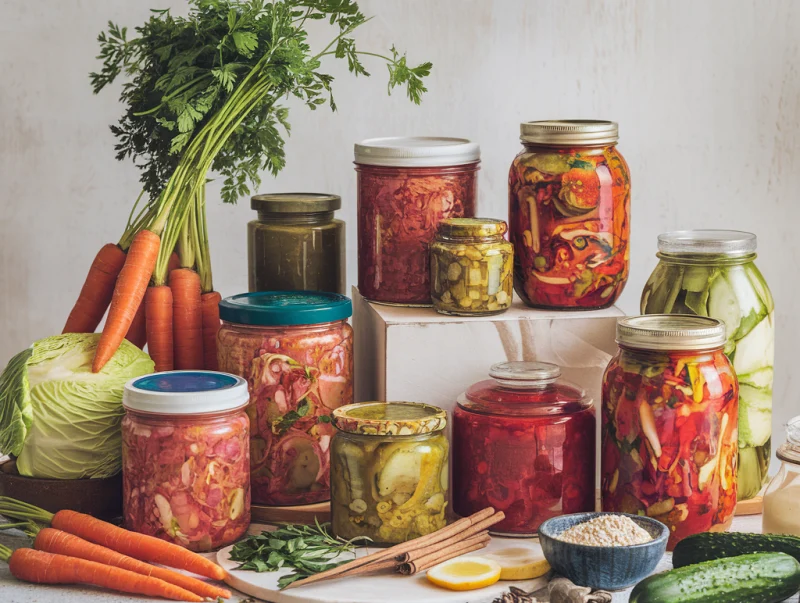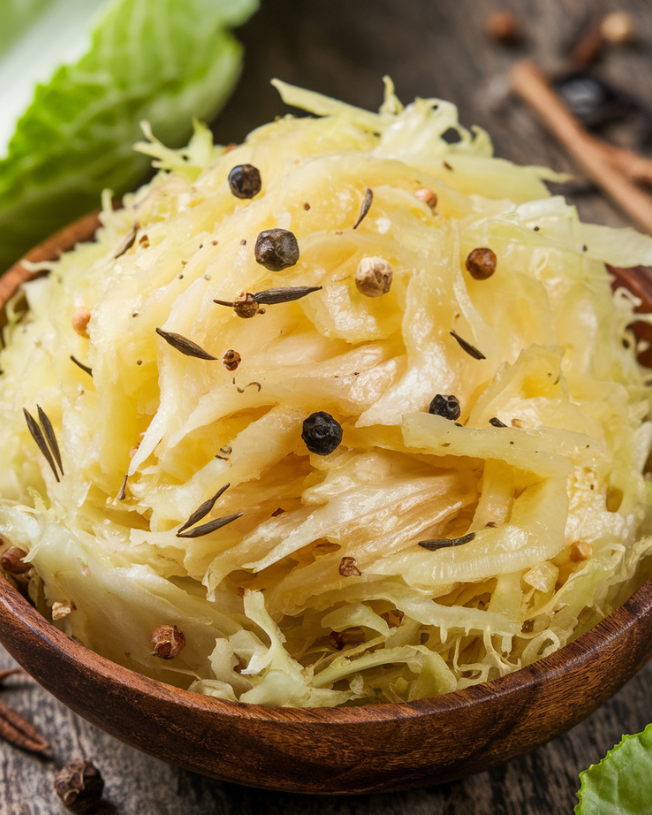Fermented vegetables are a delicious, nutritious addition to any diet. From enhancing gut health to supporting the immune system, they provide a wealth of health benefits. But what makes fermented vegetables so powerful? In this guide, we’ll explore their fascinating history, the science of fermentation, and practical tips for including them in your daily routine.
Table of Contents
Toggle
Health Benefits of Fermented Vegetables You Should Know
One of the primary reasons people consume fermented vegetables is their incredible health benefits. By incorporating these foods, you’re adding probiotics, beneficial bacteria, and essential nutrients into your diet. Fermented vegetables have been shown to promote gut health, improve digestion, and even support immune function. They’re also linked to benefits for mental well-being, metabolic health, and weight management.
Understanding Fermented Vegetables: A Historical Perspective
Fermenting vegetables has been a dietary staple across cultures for centuries. Their origins date back to ancient preservation methods, allowing people to store food during times when refrigeration wasn’t available. Fermentation provided a way to make vegetables last longer and enhanced their flavors and nutrients in the process.
Ancient Preservation Methods and Cultural Significance
In various cultures, these fermented foods have held cultural importance. In Korea, kimchi remains a staple with deep-rooted traditions, while in Europe, sauerkraut was used to sustain populations through harsh winters. These foods were valued not just for their long shelf life but also for their health properties.
Traditional Fermentation Techniques Across Cultures
The techniques vary by region and type of vegetable. For example, sauerkraut involves shredded cabbage and salt, while kimchi uses a spicier mix, often including garlic and ginger. Pickling methods in Asia, the Middle East, and Europe all feature unique ingredients, each adding distinct flavors and health benefits.
Evolution of Fermentation in Modern Times
Today, fermentation has regained popularity due to its health benefits and unique flavors. It’s now easier than ever to find fermented vegetables in stores or even make them at home with simple equipment and ingredients. Modern science has confirmed what ancient cultures knew—that fermented foods support our well-being in numerous ways.
The Science Behind Fermentation Process
The process of fermentation is fascinating, transforming raw vegetables into probiotic-rich foods through the action of beneficial bacteria.
Beneficial Bacteria and Microorganisms
Lactic acid bacteria, particularly Lactobacillus, are the primary drivers of vegetable fermentation. These bacteria convert sugars in the vegetables into lactic acid, which acts as a natural preservative and creates that tangy flavor.
Chemical Changes During Fermentation
During fermentation, vegetables undergo various chemical changes. The process releases enzymes that break down complex nutrients, making them more digestible. This natural process enhances the nutritional profile of the vegetables, providing a range of bioactive compounds that support health.
Role of Salt and Temperature
Salt is essential in vegetable fermentation. It prevents the growth of harmful bacteria, creating an environment where beneficial bacteria can flourish. Temperature also plays a role; most vegetable ferments do well in cooler environments, which control the rate of fermentation and enhance flavor.
Nutritional Profile of Fermented Vegetables
These fermenting vegetables are nutrient powerhouses. Beyond providing vitamins and minerals, they offer a range of bioavailable nutrients that are easy for the body to absorb.
Gut Health and Digestive Benefits
The probiotic properties of fermenting vegetables are well-known for promoting gut health. These good bacteria support a balanced microbiome, crucial for digestive health and immunity.
- Probiotic Properties: The live cultures in fermented vegetables help populate the gut with beneficial bacteria.
- Improved Nutrient Absorption: Fermentation breaks down nutrients into more absorbable forms, allowing your body to access vitamins and minerals more easily.
- Digestive Enzyme Production: Fermented foods contain enzymes that aid digestion, reducing bloating and promoting a smooth digestive process.
Immune System Enhancement Through Fermented Foods
Fermenting vegetables also plays a role in immune support. A healthy gut is integral to a strong immune system, and the probiotics in these foods help strengthen natural defenses.
- Strengthening Natural Defenses: Probiotics support immune cells and help the body respond better to pathogens.
- Anti-inflammatory Properties: The beneficial bacteria in fermented vegetables can reduce inflammation in the gut and beyond, contributing to overall well-being.
Popular Types of Fermented Vegetables
Several types of fermented vegetables are widely enjoyed around the world, each bringing unique flavors and benefits.
- Sauerkraut and Cabbage Varieties: Known for its tangy taste, sauerkraut is a fermented cabbage dish rich in probiotics and easy to make at home.
- Kimchi and Asian Ferments: A spicy, flavorful ferment, kimchi is made with cabbage, radishes, and seasonings like garlic and chili powder.
- Pickled Vegetables: From cucumbers to carrots, pickling vegetables brings out a sour taste and boosts the nutrient content.
Mental Health and Cognitive Benefits
Recent studies indicate a powerful connection between gut health and mental well-being. Fermented vegetables may positively impact mood, cognitive function, and stress levels by supporting a healthy gut-brain axis.
Weight Management and Metabolic Health
Adding fermented vegetables to your diet can also support weight management and metabolic health.
- Impact on Blood Sugar Levels: The probiotics in fermented vegetables may help regulate blood sugar.
- Appetite Regulation: Fermented foods can increase satiety, making you feel full longer, which may assist with healthy weight maintenance.
Ways to Add Fermented Vegetables to Your Diet
Incorporating these nutrient-rich vegetables is simple and delicious. Here are some tips to enjoy them daily:
- Daily Serving Recommendations: A small serving of fermented vegetables, around 1-2 tablespoons, can be enough to benefit gut health.
- Recipe Ideas and Combinations: Add kimchi to rice bowls, use sauerkraut as a sandwich topping, or mix pickled veggies into salads for a burst of flavor.
Safety Considerations and Storage Tips
When fermenting vegetables at home, follow safety practices to ensure a healthy, safe product. Keep your equipment clean, use enough salt, and store your fermented vegetables in a cool, dark place. Once fermented, they can be kept in the refrigerator for several months.
Conclusion
Fermented vegetables offer an incredible array of health benefits, from digestive and immune support to metabolic and mental health. Their unique flavors and historical significance make them a valuable addition to any diet. Whether you’re enjoying sauerkraut, kimchi, or pickled veggies, incorporating fermented vegetables can be both tasty and beneficial for your well-being.










